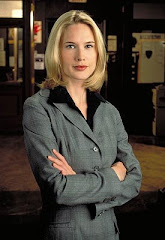The episode we watched over the weekend really made me think about assumptions in our day-to-day lives. Although I knew that the perpetrator was dangerous, I was drawn in by the Fred Savage cute factor. How could such a kind-looking person be a rapist? This kind of thinking is biased and all the more disturbing because it is deep-seated and latent in our psyche. We would not consider this part of our assumptions regarding criminals except when confronted directly with difficuly situations like the episode, "Futility." There is no one "criminal" look, and not all criminals can be distinguished by looks. Although I wish that rapists wore convenient shirts that said "RAPIST!" so that they could be avoided, this is naive and unrealistic. Perceptions of people need to be constantly challenged so that accusations are not falsely made against anyone. No one should be persecuted for their looks, race, or any other distinguishing visual factor (or other, non-visual factors, like accent).
However, this is easily said and not so easily done. Many assumptions that are embedded deep within our minds were put there at a young age. That is why subjects like Ethnic and Women's Studies are so important; they help to identify and examine some of the stereotypes that exist in society and allow students to alter their behavior to more open and tolerant. If everyone would examine their inner assumptions and biases, then problems like racial profiling and the idea of a rapist as an dark, unknown assailant would dim. It would be easier to effectively fight crime, for the blinders of stereotypes would be removed from the process.
As the class goes on, the idea of "Whose justice?" is resonating deeply. By keeping this question at the forefronts of our minds we can more easily see the bias running rampant in America's society and justice system. So far, the barrier of class has really been underlined in the episodes we watched. As we discussed in class, the homeless man in the episode we watched in class yesterday was assumed to have done something wrong and was fair game for manipulation and bullying. However, if he had been wearing an Oxford shirt and Docker's, would the police have treated him in the same way? Also, in an episode I watched outside of class, a murderer was able to hire an entire cadre of lawyers to defend himself, whereas the poor have to depend on overstretched public defenders. Where is the equality in that sort of a system? It is something to ponder as we continue to view episodes in the future.
Subscribe to:
Post Comments (Atom)
















No comments:
Post a Comment